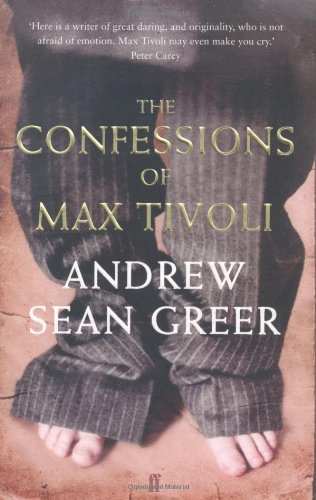Life had no before and after

The Confessions of Max Tivoli
by Andrew Sean Greer
This odd book has sat on my shelves for years unread but finally, after enjoying a couple of his short stories, I decided to give this a go. It’s a beautifully written book but it didn’t entirely engage me.
The story is that of Max Tivoli, born with the appearance of an old man in his 70s and ageing backwards over the years. In a sort of magical realism moment, no explanation is given for how that birth could possibly have worked, especially considering his mother survives it, but after that it takes the tack that Max has a condition that no-one will understand, though perhaps a handful of other people might have it. So for most of his early childhood he is hidden away, with a series of nurses brought to the house to look after him. Once he is old enough mentally to get away with it, he agrees his mother to always act the age he appears. And in time-honoured tradition, it is really only when he disobeys this mantra of his mother’s that things go wrong for him.
“I could never write a true history of my childhood, because everything happened before I knew what time was…Life had no before and after, was not yet strung upon a thread, and thus cannot be brought out from the drawer intact.”
Max is a largely unsympathetic main character, though obviously he has reasons for being how he is – selfish and stubborn – and perhaps the book is more interesting that way than if he had been a good person who sacrificed himself every time his medical condition got in the way of someone else’s happiness. But as the story is narrated by him in slightly dense prose, I found that to be a lot of time spent in the mind of someone I found unpleasant.
The conceit is an interesting one. Max is writing the story of his life as an old man with the appearance of a 12-year-old boy. He is now facing perhaps the most difficult part of his life – receding into a small child’s and then a baby’s body, and he does not know quite how it will end. So he is writing his confession, frequently addressing other characters in the story who he hopes will read it.
“This morning you were the ink monitor and soberly filled our clay inkwells to their brims before gaily dropping a tiny frog into mine. Until it perished, gagging on the lampblack, the creature left a leaping pattern across my lesson book so exquisite – a hail of dark roses falling from the sky – that I will try to place it here in this memoir as the only evidence that I am not lying.”
Though Greer does not attempt at all to make this science fiction, he does address the physical and emotional challenges of Max’s life in some detail. Which is at times disturbing, as it should be.
In a purely practical vein, I can see that the historical setting (from San Francisco in 1871 to a small Mid-West town in 1930) was necessary because a modern-day version of this story would be so much harder, what with widespread photography and needing to show ID for everything. At the very least it would have been more of a story on the run from authorities. Whereas the historical setting allows Max to spend most of his life in one city. And it also gives Greer the option to pick which historical events intrude into Max’s life.
Despite the highly unusual premise there were some clichés, and plot turns that were phrased as though they were intended as revelations but did not surprise me for a second. Was that actually the intention or a failure of plotting? It’s hard to tell. Perhaps it was intended to show that even Max’s extraordinary life is subject to the same banal basic needs as everyone else’s.
“We all hate what we become. I’m not the only one…I have seen men back from war, squinting at themselves in shop windows as they feel their skull beneath their skin. They thought they would shed the worst of youth and gain the best of age, but time drifted over them, sand-burying their old hopes. Mine is a very different story, but it all turns out the same.”
As for secondary characters – Max’s mother features very little despite her being so central to his survival. Again, I can see that this might be a deliberate device, showing how little Max thinks of his poor ever-sacrificing mother. Max’s best friend Hughie is wonderful, even if he is the subject of some of the worst clichés in the story. But even he and Alice, the love of Max’s life, really aren’t fleshed out fully. And you can go on filing that under Max’s narration and his character flaw of being selfish and not really trying to understand other people, but there should have been a way to let them come to life.
It’s certainly not a bad book by any means. It was a slow, thoughtful read and really moved me at the end. I’m glad I finally picked it up. I will certainly check out Greer’s other novel The Story of a Marriage, which got a lot of positive noises a couple of years ago.
Published 2004 by Faber and Faber.
Source: I think this was a freebie from an old job. It’s been sat on my shelves a long time.
Challenges: I read this for the 2013 TBR Pile Challenge.
One Comments
Comments are closed.